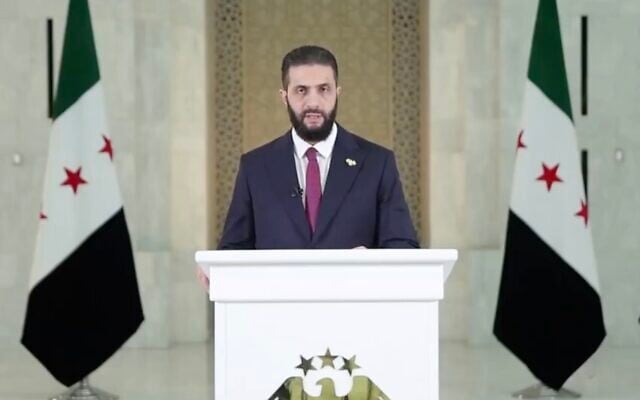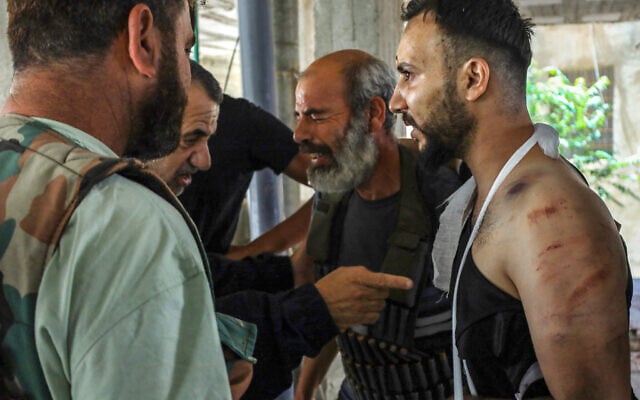Syria’s interim President Ahmad al-Sharaa urged Sunni Muslim Bedouin tribes Saturday to “fully commit” to a ceasefire aimed at ending clashes with Druze-linked militias that left hundreds dead and threatened to unravel the country’s post-civil-war transition.
The remarks came as government forces, who were initially sent to restore order but effectively sided with the Bedouins against the Druze, were redeployed to halt renewed fighting that erupted late Thursday in the southern province of Sweida. The violence also drew airstrikes against Syrian forces by neighboring Israel before a truce was reached.
In his second televised address since the fighting started, Sharaa blamed “armed groups from Sweida” for reigniting the conflict by “launching retaliatory attacks against the Bedouins and their families.” He also said Israeli intervention “pushed the country into a dangerous phase.”
Israel had launched dozens of airstrikes on convoys of government fighters and struck the Syrian defense ministry headquarters in central Damascus, saying it was acting in support of the Druze, who form a substantial community in Israel and are seen as a loyal minority, often serving in the Israeli military.
Reports have surfaced of Syrian government-affiliated fighters executing Druze civilians and looting and burning homes over four daysof violence.
The US ambassador to Turkey, Tom Barrack, who is also serving as special envoy to Syria, announced that Israel and Syria had agreed to a ceasefire early Saturday. Sharaa made no direct reference to the agreement in his speech, but said “American and Arab mediations stepped in” to restore calm.
Addressing the Bedouins, Sharaa said they “cannot replace the role of the state in handling the country’s affairs and restoring security.” He also said: “We thank the Bedouins for their heroic stances but demand they fully commit to the ceasefire and comply with the state’s orders.”

Sharaa reiterated that Sweida “remains an integral part of the Syrian state, and the Druze constitute a fundamental pillar of the Syrian national fabric,” vowing to protect all minorities in Syria.
He also thanked the United States for its “significant role in affirming its support for Syria during these difficult times,” as well as thanking Arab countries and Turkey, who mediated Wednesday’s truce.
In response, Foreign Minister Gideon Sa’ar issued a statement condemning Sharaa’s speech for glorifying the “jihadist attackers” who carried out the attacks while blaming the Druze victims.
“In al-Shara’s Syria, it is very dangerous to be a member of a minority—Kurd, Druze, Alawite, or Christian,” Sa’ar continued. “This has been proven time and again over the past six months.”
“The international community has a duty to ensure the security and rights of the minorities in Syria and to condition Syria’s renewed acceptance into the family of nations on their protection.”
Sa’ar’s post did not address the Israel-Syria ceasefire announced overnight by the United States. The Prime Minister’s Office also has not commented on the ceasefire.

Meanwhile, a prominent Druze leader, Sheikh Hikmat Al-Hijri, who opposes the current government and has distanced himself from the two ceasefires announced on Tuesday and Wednesday, said an agreement brokered under the sponsorship of guarantor states has several measures aimed at de-escalating tensions in Sweida.
This includes the deployment of Syrian General Security Service checkpoints outside the province’s administrative borders to contain clashes and prevent infiltration, a 48-hour ban on entry by any party into border villages, and safe, guaranteed passage for remaining members of the Bedouin tribes still inside the province.
More than half of the roughly 1 million Druze worldwide live in Syria. Most of the other Druze live in Lebanon and Israel, including in the Golan Heights, which Israel captured from Syria during the 1967 Six-Day War.

